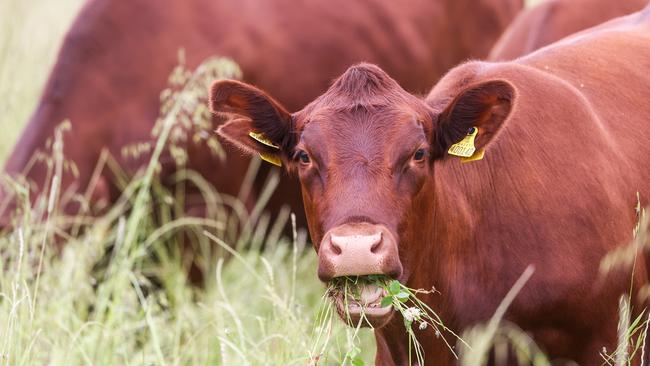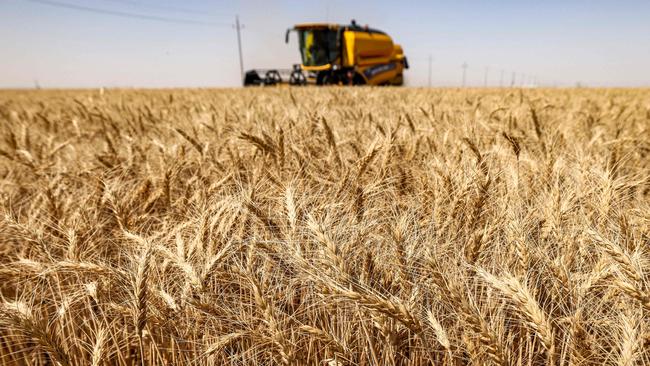Don’t listen to scaremongers, Atlas Carbon tells Aussie farmers
Investing in carbon sequestration projects is an expensive business for farmers and some are being scared off by misinformation, an industry expert says.

Losing Coles or Woolworths as a buyer; or having the wool pulled over your eyes by a carbon cowboy, are among reasons farmers are holding back from taking steps to reduce carbon on their landholdings, Atlas Carbon chief executive Ashley Silver says.
Ms Silver was dismayed to discover that at the nation’s two biggest red meat industry events, Beef Australia and LambEx, many farmers were being scared away from the carbon market.
“These big cornerstone events only happen every few years and I was upset to see that there’s still a lot of fear mongering and scaremongering happening around options for farmers with regard to carbon markets,” she said.
Australia’s carbon trading market is $600m and growing, and Australian Carbon Credit Units are trading at record volumes and prices.
Globally, the market could reach $US10bn-40bn ($14.9bn-$59.5bn) by the end of the decade, according to an estimate by Shell and Boston Consulting Group.
Yet its uptake and effectiveness in reducing global warming remains mired in controversy and many politicians, executives, environmentalists and farmers are not super confident on how to respond. The UN has also started to push back on carbon trading becoming a get-out-of-jail-free option for large emitters.
As part of the Paris Agreement, Australia has committed to the global goal of holding the increase in global average temperatures to below 2C of warming and has a legislated target of net-zero greenhouse gas emissions by 2050.

As a major fossil fuel-producing nation, early plans for net zero involved the use of carbon trading, but scepticism is mounting about how effective this will be in reducing greenhouse emissions, to the extent that iron ore giant Fortescue last month said it would no longer buy carbon offsets.
Coles and Woolworths are among companies that have committed to net zero.
Ms Silver said some supposed carbon experts speaking at major agricultural events were warning the supermarket giants might start insisting farmers keep their ACCUs so that they can claim carbon neutrality on the back of this.
“A plethora of misinformation is seeding confusion,” she said. “As a result, producers are sitting back and waiting – or understandably filing it in the ‘too hard basket’ – and neither is good if we are trying to drive urgent climate action.”
Fourth generation cattle breeder Jared Doyle agreed confusion abounds, which was not helpful given the “substantial investment” farmers needed to make to determine what carbon programs could work on their properties, set up the program, and meet the strict regulatory requirements.

“It’s a substantial investment in time to get the project registered in the first place, and then each farm will be different depending on what land management changes they are looking to make to achieve their objectives,” he said.
Mr Doyle – with Atlas Carbon as the co-proponent – has just had a soil carbon project registered with the Clean Energy Regulator.
Atlas Carbon is owned by Alasdair MacLeod, formerly the publisher of The Australian and The Daily Telegraph.
Mr Doyle’s family business is building the infrastructure (fences and watering points) required to change its grazing management.
It will then take about five years before his registered property has ACCUs based on carbon soil sequestration, ready to sell.
The question then, is why bother spending money on carbon sequestration if there are question marks about its long-term value?
For Mr Doyle it’s clear. Australian governments may have waxed and waned on climate change but the science backs soil sequestration – the program he is using – as a method of retaining carbon.
The government backs ACCUs because the nation just isn’t going to be able to just shut down all its power plants and the world continues to need iron ore for steel.
Perhaps more importantly for Mr Doyle, the work his family is putting into soil sequestration is good for the land, and therefore good for the long-term viability of his farm.
Mr Doyle uses an Atlas Carbon grazing program which guides stocking rates and pasture and underpins the changes he will make through the soil carbon project.
“From a soil carbon perspective, the techniques that are recommended for increasing soil carbon are also fairly consistent with increasing productivity in the grazing system as well. So there’s complementary benefits there,” he said. “I’m comfortable that there are benefits in the soil carbon space for both the community and for individual landholders under the correct environmental conditions on each individual farm.”

Mr Doyle acknowledges there is concern in his industry about what the supermarket giants may do or – more to the point – expect farmers to do as part of Scope 3 emissions targets.
“I am hopeful that being an early adopter and having some evidence of the steps we have taken and the possible improvements to our own climate will stand us in good stead to access markets, if that’s what is required,” Mr Doyle said.
Woolworths’ plan involves a pre-farmgate emissions reduction goal for agriculture of 40 per cent by 2033, which is work that would need to be undertaken by farmers themselves. A company spokesman would not comment specifically on whether that would mean farmers may need to keep rather than trade their ACCUs to meet that target.
“We appreciate that farmers need to make independent, informed decisions about how they approach this issue, with respect to their own business needs,” he said. “We are supportive of carbon reduction in supply chains. Our own work in this space continues to evolve and will be informed by relevant standards.”
Ms Silver said there needed to be an understanding that some farming land is more adaptable to carbon sequestration than others.
“This reality is being ignored by those pushing the message that all producers must strive for carbon neutrality and inset their livestock emissions from what they have on their property,” she said. “Will we therefore have to stop red meat production on the grazing lands which can never be carbon neutral? What if this is the majority of our red meat industry?”
Ms Silver said she believed the big end of town did not have a viable pathway to address its scope 3 emissions at scale and was essentially pushing the problem back to producers to deal with, adding a farm-by-farm carbon neutral mandate is impractical in the short-term.
“Surely, as an industry and a nation, we want our producers to feel comfortable and supported in transitioning practices to help them be more resilient and to address the climate crisis,” she said.
“Until we have clear and supported pathways provided by the supply chain, let’s ensure we protect and reward the farmers who want to act now and lead the way via our carbon markets.”




To join the conversation, please log in. Don't have an account? Register
Join the conversation, you are commenting as Logout